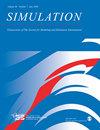在大规模基于主体的流行病模拟中模拟人类行为的框架
IF 2
4区 工程技术
Q4 COMPUTER SCIENCE, INTERDISCIPLINARY APPLICATIONS
Simulation-Transactions of the Society for Modeling and Simulation International
Pub Date : 2023-08-08
DOI:10.1177/00375497231184898
引用次数: 1
摘要
基于主体的建模越来越多地用于计算流行病学,以表征重要的行为维度,例如在研究疾病传播时个体对干预反应的异质性。现有的基于代理的模拟框架和平台目前分为两类:一类是可以模拟数百万个体的简单行为(例如,基于简单状态机),另一类是考虑更复杂的社会行为(例如,根据自己的议程和偏好行事的代理,并考虑规范遵从性),但由于涉及推理的计算复杂性,可扩展性有限。在本文中,我们提出了一个新的框架,该框架使大规模分布式流行病模拟具有复杂行为的社会主体,其决策基于各种概念和内部态度,如感觉、知识、偏好、规范和计划。提出的框架支持数以百万计这样的代理的模拟,这些代理可以单独考虑自己的知识、目标和偏好,并可以根据其他代理的行为和他们对遵守规范的态度来调整自己的行为。我们通过开发COVID-19在美国弗吉尼亚州传播的模型,展示了拟议框架的适用性和可扩展性。结果表明,该框架可以有效地用于模拟数百万复杂行为因子的疾病传播,并在几个月的时间内调查行为干预。本文章由计算机程序翻译,如有差异,请以英文原文为准。
A framework for modeling human behavior in large-scale agent-based epidemic simulations
Agent-based modeling is increasingly being used in computational epidemiology to characterize important behavioral dimensions, such as the heterogeneity of the individual responses to interventions, when studying the spread of a disease. Existing agent-based simulation frameworks and platforms currently fall in one of two categories: those that can simulate millions of individuals with simple behaviors (e.g., based on simple state machines), and those that consider more complex and social behaviors (e.g., agents that act according to their own agenda and preferences, and deliberate about norm compliance) but, due to the computational complexity of reasoning involved, have limited scalability. In this paper, we present a novel framework that enables large-scale distributed epidemic simulations with complex behaving social agents whose decisions are based on a variety of concepts and internal attitudes such as sense, knowledge, preferences, norms, and plans. The proposed framework supports simulations with millions of such agents that can individually deliberate about their own knowledge, goals, and preferences, and can adapt their behavior based on other agents’ behaviors and on their attitude toward complying with norms. We showcase the applicability and scalability of the proposed framework by developing a model of the spread of COVID-19 in the US state of Virginia. Results illustrate that the framework can be effectively employed to simulate disease spreading with millions of complex behaving agents and investigate behavioral interventions over a period of time of months.
求助全文
通过发布文献求助,成功后即可免费获取论文全文。
去求助
来源期刊
CiteScore
3.50
自引率
31.20%
发文量
60
审稿时长
3 months
期刊介绍:
SIMULATION is a peer-reviewed journal, which covers subjects including the modelling and simulation of: computer networking and communications, high performance computers, real-time systems, mobile and intelligent agents, simulation software, and language design, system engineering and design, aerospace, traffic systems, microelectronics, robotics, mechatronics, and air traffic and chemistry, physics, biology, medicine, biomedicine, sociology, and cognition.

 求助内容:
求助内容: 应助结果提醒方式:
应助结果提醒方式:


